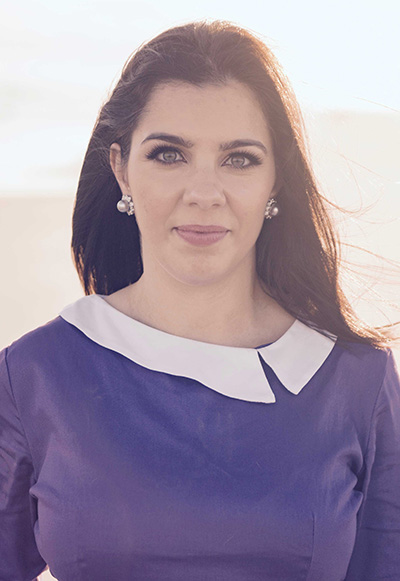
Dr. Daniela Tirnovan
Education
Ph.D. Mathematics Education (2024); Rutgers State University, New Brunswick, NJ
Master of Science in Education in Elementary Mathematics Education (2017); City University
of New
York, Brooklyn, NY
Bachelor of Arts in Linguistics and Philosophy (2014); City University of New York,
Manhattan, NY
Teaching Philosophy
"My teaching philosophy is grounded in socio-constructivist principles, where I believe mathematical knowledge is co-constructed through social interaction and collaborative exploration. I approach mathematics education through sociolinguistic and sociocultural frameworks, recognizing that students' cultural and linguistic backgrounds are valuable resources for mathematical reasoning rather than barriers to overcome. My enthusiasm for mathematics education and multilingual learners is evident from the first day I walk into a classroom. I create learning environments where students actively construct mathematical understanding through discourse and shared discovery. Using tools like Japanese lesson studies and clinical interviews, I guide future educators to listen carefully to student thinking and understand how cultural contexts shape mathematical learning. I want my students to become confident in facilitating mathematical discourse as teachers where emergent multilingual students can leverage their full linguistic repertoires. Through assignments like mathematics autobiographies and community-based problem solving, preservice teachers are invited to honor diverse ways of knowing and doing mathematics. Since joining higher education, I conduct professional development workshops that help teachers recognize how sociolinguistic practices support mathematical reasoning. I collaborate with teachers to implement pedagogies where students use translanguaging practices to deepen their mathematical understanding. In all that I teach, I constantly seek opportunities to become a more effective educator. My door is always open to students, and they know I care about them as future educators. I want them to create classrooms where all students can construct mathematical knowledge through culturally and context responsive practices."
Research
Dr. Tirnovan's research examines translanguaging practices in mathematics education, teacher mathematical identities and personified relationships with mathematics, error analysis in algebra learning, and the impact of mastery-based testing on student anxiety and mindsets. Dr. Tirnovan has investigated preservice teachers' reasoning about fractions, elementary teachers' understanding of unit fractions, and relationships between teacher and parent attitudes and student affective characteristics in mathematics. Recent work explores computational thinking as a pathway for mathematics teachers to integrate AI in mathematical learning, mathematical problem-solving patterns, and the interpretability of mathematics without supporting language. Moving forward, she is interested in investigating individual, relational, and communal translanguaging identity development, long-term impacts of critical translanguaging spaces on students' mathematical identities and achievement, and developing teacher education programs that prepare educators to implement translanguaging strategies in diverse mathematics classrooms. Future research will also examine how AI integration can support personalized mathematics instruction for emergent multilingual learners and explore the intersection of computational thinking with equitable mathematics pedagogies.
Outreach
Dr. Tirnovan conducts professional development workshops for K-8 mathematics teachers on supporting emergent multilingual learners, effective use of manipulatives, and AI integration in elementary mathematics. Through community-engaged partnerships with minoritized multilingual families, she can facilitate family math nights that center families' linguistic and mathematical expertise, creating bridges between school mathematics and community cultural practices.
Biography
Dr. Tirnovan is a distinguished mathematics educator and researcher who joined the faculty at the University of South Alabama in 2025. Bringing a unique global perspective to the College of Education and Professional Studies, her work is informed by multilingual experiences across diverse educational systems, fostering a deep understanding of varied learning contexts.
Dr. Tirnovan holds an interdisciplinary academic foundation that bridges linguistics, philosophy, and advanced pedagogy. She received her PhD in Mathematics Education from Rutgers University, along with her Master of Science in Mathematics Education and a Bachelor of Arts in Linguistics and Philosophy.
With a career spanning K-12 leadership and higher education, Dr. Tirnovan has served in several pivotal administrative and instructional roles, including: formerly served as the Dean of Curriculum and Mathematics Supervisor (Grades 3–8). Designed and led courses in mathematics methods, STEAM education, and action research methodologies. Serves as the Editor for the International Journal for Mathematics Teaching and Learning. Architect of specialized institutes for K–8 mathematics teachers, focusing on content knowledge and pedagogical innovation.
Dr. Tirnovan’s current work is dedicated to enhancing mathematical confidence and reasoning abilities for all learners. Their primary areas of focus include: Teacher Preparation: Training educators in the use of clinical interviews and Japanese Lesson Study to better understand student cognition. Statewide Impact: Actively supporting the goals of the Alabama Numeracy Act through targeted mathematics and education methods courses. Pedagogical Innovation: Researching the intersection of teacher content knowledge and inclusive instructional practices.
Through her multifaceted role at South, Dr. Tirnovan continues to advance the field of mathematics teacher preparation, ensuring educators are equipped with the tools necessary to foster high-level mathematical reasoning in the classroom.
